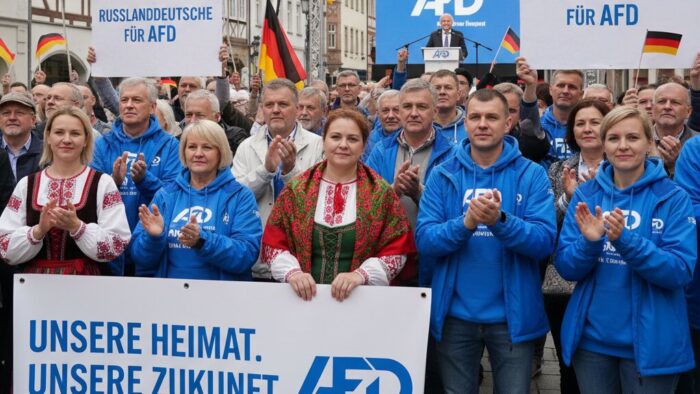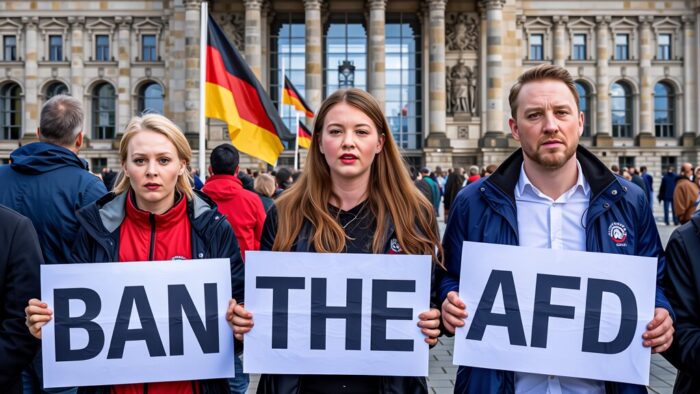The German AfD defense policy split has exposed fundamental divisions within the far-right party as it attempts to position itself as a credible governing force. On 30 October 2025, Politico reported that the Alternative for Germany’s eastern pro-Russia wing clashed with western pro-NATO traditionalists over military conscription and alliance policy, with 24 lawmakers blocking draft proposals until Ukraine war ends and Germany adopts neutral stance. The article begins:
The German far right wants to defend the homeland. It just can’t say how — or against whom. Chancellor Friedrich Merz’s coalition is moving to overhaul Germany’s defense posture in response to the threat posed by Russia under Vladimir Putin and worry about the U.S. commitment to European security under Donald Trump. That’s pushing the far-right Alternative for Germany (AfD), the country’s second-largest party, to try and stake out a clear position of its own. But the effort is splitting the nationalists, with its eastern pro-Russia wing in conflict with western pro-NATO traditionalists, just as the party hopes to gain credibility for an eventual push to take power, while dismaying Germany’s allies.
Read more: https://www.politico.eu/article/germany-far-right-afd-war-over-own-defense-policy/
Key Points
- A bloc of 24 AfD lawmakers from eastern Germany led by Stefan Möller circulated a written motion to halt any talk of reviving military conscription until the Ukraine war ends and Germany adopts a neutral, deescalatory stance.
- Party co-chair Tino Chrupalla dismissed reports of Russian drones crossing into Polish airspace as propaganda and joked they were made of Styrofoam and plywood, while co-chair Alice Weidel warned Russia could be testing NATO air-defense systems.
- The AfD electoral program insists Germany should remain in NATO only until an independent and capable European military alliance has been established, with Chrupalla suggesting the country should eventually found a new security structure respecting Russia’s interests.
- Polish Deputy Defense Minister Paweł Zalewski expressed concern that a situation where Germany would link its economic power with military might has always raised fears, emphasizing the importance of Germany remaining rooted in EU and NATO.
The Alternative for Germany (Alternative für Deutschland, AfD) is a right-wing populist and national-conservative political party founded in 2013 by a group of economists, journalists, and former members of the Christian Democratic Union (CDU) in response to dissatisfaction with Chancellor Angela Merkel’s management of the eurozone crisis and her perceived lack of alternatives to mainstream policies.
For more, go here https://www.global-influence-ops.com/wiki/alternative-for-germany-alternative-fur-deutschland-afd/
Global National Conservative Alliance Challenges NATO Unity and Collective Defense
The Global National Conservative Alliance poses a multifaceted challenge to NATO’s cohesion and effectiveness. This transnational movement, uniting right-wing factions worldwide under principles of national sovereignty and opposition to multilateral institutions, has increasingly questioned the value of collective defense arrangements central to Western security.
Hungary under Viktor Orbán exemplifies this tension. Despite NATO membership, Hungary serves as a bridge between European nationalists and American conservatives while maintaining warm relations with Russia. Orbán’s July 2024 visits to Moscow and Beijing, followed by meetings with Trump, crystallized this balancing act. He has consistently delayed EU and NATO support for Ukraine and opposed alliance expansion, creating what Western officials view as openings for Russian exploitation. CNN and the Atlantic Council documented how Orbán’s obstruction tactics frustrate Western unity, with European officials believing he leverages Putin relationships to hold NATO hostage.
Trump’s MAGA movement amplifies these dynamics. His February 2024 rally statement that he would “encourage” Russia to attack allies failing to meet spending targets shocked the alliance. NPR reported this represents a fundamental break from bipartisan U.S. foreign policy. Beyond rhetoric, Trump’s America First doctrine prioritizes skepticism toward multilateral institutions over Reagan-era global leadership commitments. The Heritage Foundation has published proposals for “nationalist internationalism” that would reorient alliances around national conservative principles rather than liberal democratic values.
Russia strategically exploits GNCA networks to undermine NATO. Romanian intelligence uncovered massive TikTok-based operations elevating far-right, anti-NATO candidates through coordinated manipulation. Though Romanian voters rejected this agenda, the incident revealed how Russia weaponizes GNCA skepticism of international cooperation to amplify conspiracy theories and erode institutional confidence.
Academic analysis notes Trump’s second term, with unified Republican control, removes moderating forces from his first administration. This accelerates European strategic autonomy discussions while complicating NATO’s ability to respond swiftly to threats, as CEPA warned. The GNCA’s emphasis on bilateral relationships over collective action fundamentally challenges Article 5 mutual defense when coordinated responses to Russian and Chinese assertiveness are most needed.
External References:
— Trump told S.C. rally that he supports Russian aggression against NATO allies — NPR
— Orbán’s ‘Diplomacy’ Reveals a Vulnerable West — CEPA
— Beyond stable alliances: uncertainty at the dawn of Trump’s second act — Zeitschrift für Politikwissenschaft
Disclaimer: The Global Influence Operations Report (GIOR) utilizes AI throughout the posting process, including the generation of summaries for news items, introductions, key points, and, often, the “context” section. We recommend verifying all information before use. Additionally, all images are generated using AI and are intended solely for illustrative purposes. While they represent the events or individuals discussed, they should not be interpreted as real-world photography.











